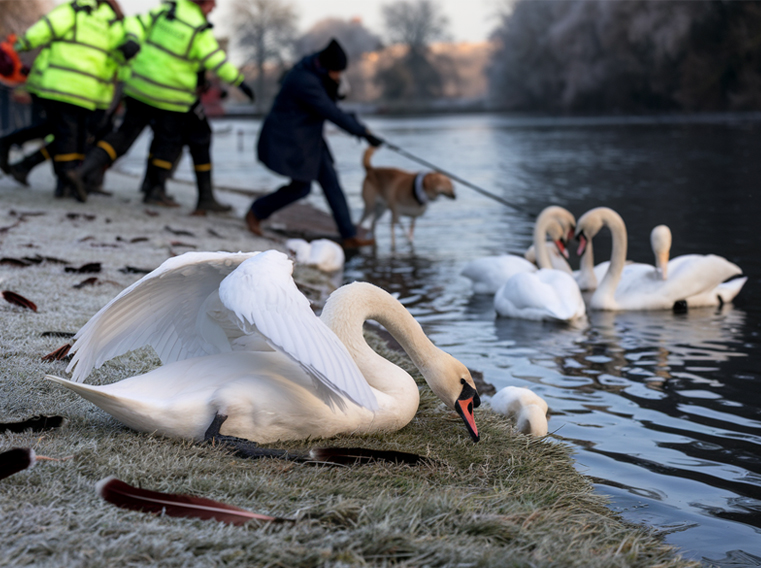From artisanal crepes to rebellious cheesecake waffles, Reading's breakfast rebels are transforming morning meals. These seven spots will revolutionize how you start your day.
The tranquil waters of Berkshire were shattered this Christmas as multiple swans fell victim to two separate, brutal dog attacks. A local wildlife charity has raised the alarm, reporting the tragic loss of these majestic birds during what should have been a peaceful holiday period. The incidents, described as "extremely vicious," have sparked concerns about pet control and wildlife safety in the area's popular waterways. As authorities investigate these distressing events, questions arise about the measures needed to protect vulnerable wildlife and maintain harmony between nature and urban life.
Details of the Swan Attacks

The serene waters of Berkshire were marred by tragedy this Christmas season as multiple swans fell victim to two separate dog attacks. Swan Support, a local wildlife charity, reported the incidents which occurred during what should have been a peaceful holiday period. The attacks, described as "extremely vicious," resulted in the deaths of at least two swans, with potentially more injured.
The first incident took place at Herschel Park in Slough, where a swan was fatally mauled by an unleashed dog. Eyewitnesses reported the distressing scene to Swan Support, who responded promptly but were unable to save the bird. The second attack occurred at Bray Lake, near Maidenhead, where another swan succumbed to injuries inflicted by a dog. In both cases, the dogs' owners were present but unable to prevent the attacks.
Wendy Hermon, operations director at Swan Support, expressed her dismay at the situation. "These attacks were particularly brutal and highlight the ongoing issue of irresponsible dog ownership near wildlife habitats," she stated. The charity has been working tirelessly to treat injured swans and educate the public about the importance of keeping dogs under control in areas frequented by waterfowl.
Local authorities, including the Thames Valley Police, have been notified and are investigating the incidents. They are urging anyone with information about the attacks to come forward to assist in their enquiries.
Community Impact and Calls for Action
The tragic loss of these swans has sent shockwaves through the Berkshire community, prompting discussions about the need for stricter regulations and enhanced protection for wildlife in urban and suburban areas. Local residents have expressed their sorrow and outrage, with many calling for increased patrols in parks and waterways known for their swan populations.
Environmental groups are using this unfortunate event to highlight the broader issue of human-wildlife conflict in developed areas. They argue that as urban sprawl continues to encroach on natural habitats, incidents like these may become more frequent unless preventative measures are taken.
Some community leaders are proposing the implementation of designated off-leash areas for dogs, well away from known wildlife hotspots. Others are advocating for mandatory training programs for dog owners, focusing on recall skills and wildlife awareness.
The incidents have also sparked a debate about the effectiveness of current wildlife protection laws. Legal experts point out that while there are penalties for harming protected species like swans, enforcement can be challenging, and prevention should be the primary focus.
As the community grapples with these issues, there is a growing consensus that a multi-faceted approach involving education, infrastructure improvements, and community engagement will be necessary to prevent future tragedies and ensure the peaceful coexistence of residents, pets, and wildlife in Berkshire's cherished natural spaces.
A Call for Coexistence: Berkshire's Swan Tragedy as a Catalyst for Change
The festive season in Berkshire was marred by heart-wrenching swan attacks, serving as a stark reminder of the delicate balance between urban life and wildlife. These tragic incidents have illuminated the pressing need for a comprehensive approach to wildlife protection in our increasingly urbanised landscapes.
The attacks present both a challenge and an opportunity for Berkshire's communities. On one hand, they highlight the risks posed to vulnerable wildlife by inadequate pet control. On the other, they offer a chance to galvanise public support for enhanced conservation efforts and responsible pet ownership.
Moving forward, local authorities and wildlife organisations must collaborate to implement robust strategies. These could include increased signage in wildlife-rich areas, designated off-leash zones for dogs, and community education programmes. The tragedy also underscores the importance of strengthening and enforcing wildlife protection laws.
Ultimately, the Berkshire swan attacks serve as a clarion call for a new era of human-wildlife coexistence. As urban areas continue to expand, how can we ensure that our natural heritage is preserved and protected? The answer lies not just in policy changes, but in a collective shift in mindset.
What role will you play in fostering a community that respects and protects its wildlife? The future of Berkshire's swans – and indeed, all its wildlife – depends on the actions we take today.